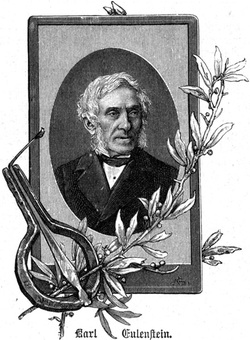KARL EULENSTEIN
Jew's Harp Virtuoso

1890 One great virtuoso Jew's Harpist, was Karl Eulenstein (1802-1890), he died at 88 years old. At 8 years old, he started violin lessons (using his father's violin, who died when Karl was 5). He was very musically gifted and practiced daily. When he reached the age for apprenticeship, he went from a bookbinder, to a merchant, and graduated as a baker ... but his first love was always music.
While working for the merchant, he bought his first Jew's Harp.. He fell in love with the Jew's Harp and practiced in his spare time. During this time, he heard the Jew's Harp virtuoso, Franz Koch (1761-1831), in concert. Franz had a powerful affect on him and he decided he also wanted to be a Jew's Harp virtuoso. A few years later, he heard Kunert, another Jew's Harp virtuoso, and was also greatly influenced by him. Soon, he began to compose his own variations to different songs. He tried to set up his own private concerts, but lacking finances, contacts and public playing experience, he was not successful.
In 1824, he played his first successful concert in Stuttgart, Germany. Soon he became more successful, but always lived near poverty much of the time. He also taught himself to play guitar and was soon becoming well- known throughout Europe for his Jew's Harp mastery. He became recognized as one of the finest players in London ... and played for royalty (such as the Dukes of York, the Duchess of Kent [mother of Queen Victoria], and the King of England). He lost one of his front teeth and with a false tooth, he could not play the Jew's Harp for awhile. He turned to giving guitar lessons for income and was very successful at this for many years. He started playing Jew's Harp again, making a good income. But eventually he lost most of his teeth and had to stop playing Jew's Harp altogether. He married and had three children, living in his native home of Heilbronn until his death. He was truly a great Jew's Harp player and for that reason alone he should never be forgotten.
While working for the merchant, he bought his first Jew's Harp.. He fell in love with the Jew's Harp and practiced in his spare time. During this time, he heard the Jew's Harp virtuoso, Franz Koch (1761-1831), in concert. Franz had a powerful affect on him and he decided he also wanted to be a Jew's Harp virtuoso. A few years later, he heard Kunert, another Jew's Harp virtuoso, and was also greatly influenced by him. Soon, he began to compose his own variations to different songs. He tried to set up his own private concerts, but lacking finances, contacts and public playing experience, he was not successful.
In 1824, he played his first successful concert in Stuttgart, Germany. Soon he became more successful, but always lived near poverty much of the time. He also taught himself to play guitar and was soon becoming well- known throughout Europe for his Jew's Harp mastery. He became recognized as one of the finest players in London ... and played for royalty (such as the Dukes of York, the Duchess of Kent [mother of Queen Victoria], and the King of England). He lost one of his front teeth and with a false tooth, he could not play the Jew's Harp for awhile. He turned to giving guitar lessons for income and was very successful at this for many years. He started playing Jew's Harp again, making a good income. But eventually he lost most of his teeth and had to stop playing Jew's Harp altogether. He married and had three children, living in his native home of Heilbronn until his death. He was truly a great Jew's Harp player and for that reason alone he should never be forgotten.
